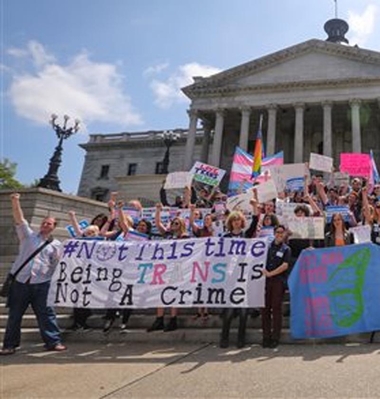Transgender advocates fear SC bill's fallout even if it dies

Columbia, S.C. (AP) — Transgender people said Thursday they fear a South Carolina bill that would require them to use the public bathroom for their biological sex will stoke misguided fears and endorse restroom vigilantism, even if the bill ultimately dies as expected.
Opponents told a Senate panel the unenforceable measure perpetuates myths against an already-ostracized community, while supporters contend it's about protecting the privacy and safety of women and children.
The measure mimics part of a North Carolina law passed last month that's caused economic fallout and debate nationwide.
A growing number of musicians have canceled concerts in North Carolina in protest, including Cyndi Lauper, Bruce Springsteen and Ringo Starr. In Massachusetts on Thursday, an LGBT group booed the Republican governor off stage when he declined to commit to legislation expanding protections for transgender people.
The South Carolina bill, introduced last week, may go nowhere.
The proposal requires multistall bathrooms on public property to be designated and used according to the gender on people's birth certificates. It would also bar local governments from requiring businesses to let transgender people use the bathroom of their choice.
No vote was taken during the panel's second and final hearing. It's not yet clear whether the full committee will consider the measure. But even if it manages to advance to the Senate floor, Sen. Joel Lourie, D-Columbia, promises to use Senate rules to block debate. House GOP leaders say their chamber won't deal with the issue before session ends in June anyway. And opponents include Republican Gov. Nikki Haley, who has repeatedly called it unnecessary.
The sponsor, GOP Sen. Lee Bright, contends his bill is a "matter of common sense," and its opponents are "forgoing the safety and privacy of the largest part of the population in order to defend" a tiny minority.
In a letter read at the hearing, Richland County Sheriff Leon Lott said the bill addresses a nonissue. In his 41 years in law enforcement, he said, he's never heard of a transgender person attacking or otherwise bothering someone in a restroom.
He said he can't enforce a bill that burdens law enforcement with bathroom checks and exposes his agency to lawsuits.
"Obviously, DNA testing is cost prohibitive," he wrote. And asking deputies to check genitalia "invades subjects' dignity and privacy."
Transgender people say the bill's requirement would put them in danger of harassment and violence, as they would clearly look out of place.
"To make discrimination legal is an atrocity," said transgender male Greg Green, a Citadel graduate and former police officer and firefighter. "Going to the bathroom is natural. Worrying about whether the person in the stall beside you is sitting or standing is not commonsense."
Sharon Mansell, a Beaufort mother of 10, said she sympathizes with transgender people's objections, but it's a mother's duty to protect her children. She said she fears that without the law, "someone with a perverted mind" can pretend to be transgender to abuse the opposite sex.
"I stand firm that we need to vote 'yes' for this bill for the protection of everyone," she said. "This is not a war against transgender people."
Oran Smith of the Palmetto Family Council said his members' top concern is "young girls who may have men in their shower rooms" at public schools.
Opponents argued laws already address assault and shower curtains can provide privacy.
O.K. Keyes, a transgender Columbia resident who works with LGBT youth, said the bill invites people to hate a community they know little about.
"The legislation claims to protect, but it actually targets youth," said Keyes, 25. "Senators get to propose legislation to stir up their base and it ultimately dies, but in the process, it garners all this attention and talking points. And no one is thinking about what happens afterward."
By Seanna Adcox, Associated Press. Copyright 2016 The Associated Press. All rights reserved. This material may not be published, broadcast, rewritten or redistributed.
The Gayly – April 15, 2016 @ 7 a.m.





